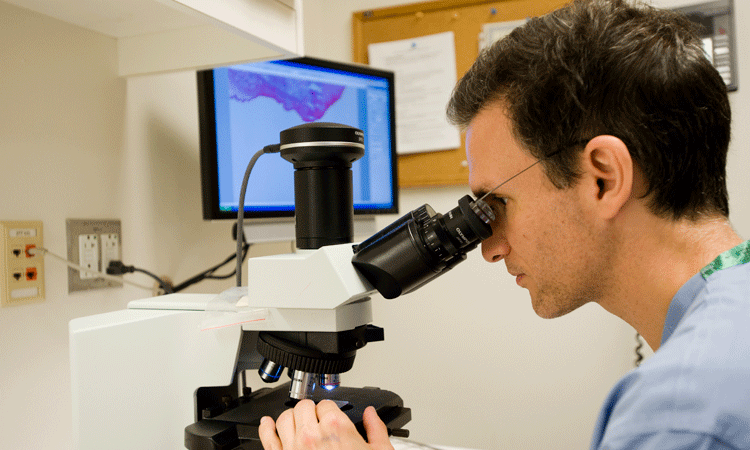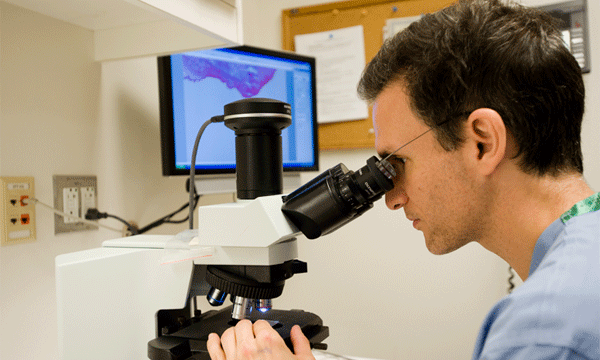Mohs Surgery
Dermatologic Surgery Unit


Contact Information
Dermatologic Surgery Unit
50 Staniford Street, Suite 270
Boston,
MA
02114
Phone: 617-726-1869
Fax: 617-726-7417
Explore This Unit
What to Expect
Massachusetts General Hospital's Dermatologic Surgery Unit offers world-class expertise in Mohs micrographic surgery and a number of other cosmetic surgical procedures.
As the rates of skin cancer have increased in recent years, we have developed streamlined processes that allow us to effectively treat more than 10 cases every day.
Our patients are usually referred to a general dermatologist by their primary care physician if skin cancer is suspected. During their initial consultation here, patients meet with a dermatologist to discuss their medical history and to have their skin cancer lesion examined and analyzed. Using this information, the dermatologist determines whether the patient is a good candidate for Mohs surgery.
The surgery itself is an outpatient procedure. We begin the process by applying a local anesthetic to the affected area (no sedation is required). Next, we excise the tumor for immediate examination and evaluation while the patient waits.
If we discover any cancer cells, the patient returns to the surgical area for the removal of a second layer. Excising all traces of cancerous tissue usually requires one or two cycles, but occasionally more are required. At each step of the process, we are careful to minimize the amount of normal tissue removed. The entire process usually takes just a few hours.
After performing the Mohs technique and the tumor is removed, we discuss with the patient whether reconstructive surgery is necessary. If the wound is small enough, it can be left to heal on its own. If this option is not possible, immediate reconstruction is performed by our cancer surgeon, who is also trained in cosmetic facial surgery.
Communication & Due Diligence
Mohs is a relatively common procedure. Our surgeons frequently exchange findings and best practices with doctors in other hospitals who also perform the surgery. This due diligence allows us to stay abreast of challenges our colleagues are encountering—and to refine our practices accordingly.
Some patients who undergo Mohs or another cosmetic procedure at our unit will require further treatment unavailable in our unit. If so, they benefit from access to the world-class medical professionals and treatment programs available at Mass General.
About This Program
The Dermatologic Surgery Unit at Massachusetts General Hospital is dedicated to the surgical treatment of skin cancer. We specialize in a minimally invasive procedure known as Mohs micrographic surgery.
What Is Mohs Surgery?
When people learn they have a skin cancer lesion on their face or another prominent area, they are usually worried about their health—and potential scarring associated with surgery. Mohs surgery was developed to address both of these concerns.
Cancer surgery involves the excision of both healthy and nonhealthy tissue for analysis and tumor removal. The microscopically controlled Mohs technique limits the amount of tissue that must be removed for these purposes. In addition, it allows the surgeon to analyze the tissue as it is removed, minimizing the wait time for the patient.
Patients undergoing Mohs surgery can experience less scarring compared to traditional surgery; in fact, 50 to 60 percent lose less normal tissue using this technique. Mohs also is highly effective—its cure rate in treating both basal cell carcinoma (the most common type of skin cancer) and squamous cell carcinoma is at least 98 percent.
The Mohs Experts
The Mass General Dermatologic Surgery Unit was one of the first programs in Boston to offer Mohs surgery. Director Victor Neel, MD, PhD, a board-certified dermatologist, has completed more than 32,000 Mohs procedures, making him one of the city's most experienced and knowledgeable Mohs surgeons.
Our doctors are also involved in clinical research and trials. Dr. Neel has a particular interest in skin cancer, and his research into the disease is ongoing.
Meet our Mohs Experts
Our experts specialize in a minimally invasive procedure known as Mohs micrographic surgery for the treatment of skin cancer.
-
![]()
- Director, Dermatologic Surgery
Patient Gateway
Secure online access to your health information whenever you need it. Check appointments, communicate with your provider and pay bills online 24/7.
Dermatologic Surgery
Mass General’s Dermatologic Surgery Unit offers world-class expertise in Mohs micrographic surgery.


